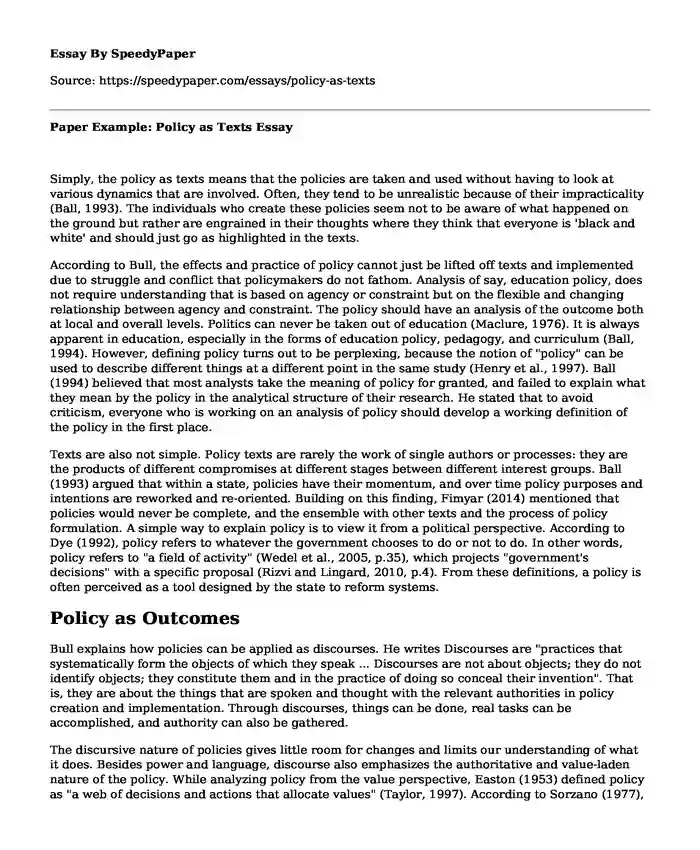
| Essay type: | Definition essays |
| Categories: | Politics Political science |
| Pages: | 3 |
| Wordcount: | 772 words |
Simply, the policy as texts means that the policies are taken and used without having to look at various dynamics that are involved. Often, they tend to be unrealistic because of their impracticality (Ball, 1993). The individuals who create these policies seem not to be aware of what happened on the ground but rather are engrained in their thoughts where they think that everyone is 'black and white' and should just go as highlighted in the texts.
According to Bull, the effects and practice of policy cannot just be lifted off texts and implemented due to struggle and conflict that policymakers do not fathom. Analysis of say, education policy, does not require understanding that is based on agency or constraint but on the flexible and changing relationship between agency and constraint. The policy should have an analysis of the outcome both at local and overall levels. Politics can never be taken out of education (Maclure, 1976). It is always apparent in education, especially in the forms of education policy, pedagogy, and curriculum (Ball, 1994). However, defining policy turns out to be perplexing, because the notion of "policy" can be used to describe different things at a different point in the same study (Henry et al., 1997). Ball (1994) believed that most analysts take the meaning of policy for granted, and failed to explain what they mean by the policy in the analytical structure of their research. He stated that to avoid criticism, everyone who is working on an analysis of policy should develop a working definition of the policy in the first place.
Texts are also not simple. Policy texts are rarely the work of single authors or processes: they are the products of different compromises at different stages between different interest groups. Ball (1993) argued that within a state, policies have their momentum, and over time policy purposes and intentions are reworked and re-oriented. Building on this finding, Fimyar (2014) mentioned that policies would never be complete, and the ensemble with other texts and the process of policy formulation. A simple way to explain policy is to view it from a political perspective. According to Dye (1992), policy refers to whatever the government chooses to do or not to do. In other words, policy refers to "a field of activity" (Wedel et al., 2005, p.35), which projects "government's decisions" with a specific proposal (Rizvi and Lingard, 2010, p.4). From these definitions, a policy is often perceived as a tool designed by the state to reform systems.
Policy as Outcomes
Bull explains how policies can be applied as discourses. He writes Discourses are "practices that systematically form the objects of which they speak ... Discourses are not about objects; they do not identify objects; they constitute them and in the practice of doing so conceal their invention". That is, they are about the things that are spoken and thought with the relevant authorities in policy creation and implementation. Through discourses, things can be done, real tasks can be accomplished, and authority can also be gathered.
The discursive nature of policies gives little room for changes and limits our understanding of what it does. Besides power and language, discourse also emphasizes the authoritative and value-laden nature of the policy. While analyzing policy from the value perspective, Easton (1953) defined policy as "a web of decisions and actions that allocate values" (Taylor, 1997). According to Sorzano (1977), Easton believed that it is a fundamental fact that scarcity of valuable things prevails in all societies which can lead to disputes over their allocation. Therefore, every society has some mechanism to control this dispute and decide who will get what. This mechanism of allocation of values was further expanded by Kogan (1975) and Prunty (1985), who elaborated "authoritative" in Easton's definition of policy as the authoritative allocation of values.
The real challenge with the policy as discourse is that there can be struggles with the enactment and interpretation of policies. Often, we respond and read policies in circumstances that are discursive, and we cannot think about it. As such, policies are seen as discursive, and it changes our thinking possibilities. Discourse is practices that systematically form the objects they speak (Foucault, 1977). Policy discourse is then about "what we can say, when, where, and about whom with the authority" (Ball, 2006, p.57). Ball (1993) argued that through policy as a discourse, only certain voices can only be heard and considered meaningful and authoritative. In this way, discourse constructs its reality by eliminating all the alternative approaches.
Bibliography
Ball, S., 1993. WHAT IS POLICY? TEXTS, TRAJECTORIES, AND TOOLBOXES. Discourse: Studies in the Cultural Politics of Education, 13(2), pp.10-17.
Cite this page
Paper Example: Policy as Texts. (2023, Aug 07). Retrieved from https://speedypaper.com/essays/policy-as-texts
Request Removal
If you are the original author of this essay and no longer wish to have it published on the SpeedyPaper website, please click below to request its removal:
- Free Essay on Camel and Cactus Test Application
- Free Essay Example on Gender and Feminist Theory
- Essay Sample on Eugene Debs Speech
- Free Essay Sample. The Special Theory of Relativity
- Paper Example. Child Abuse and Neglect
- Remembering Jim Crow: Unveiling the Racial Discrimination of a Past Era
- Essay Example: Critical Evaluation of Qualitative and Quantitative Research
Popular categories




